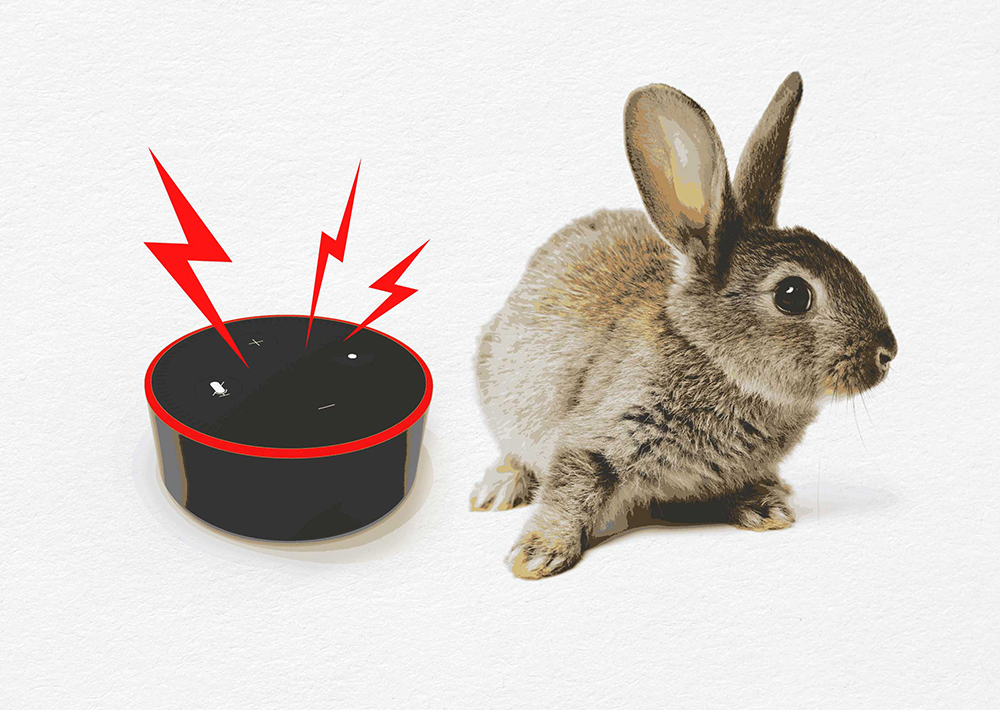
On the grounds of advancing age, I had decided to ignore all the chatter about artificial intelligence and devote my remaining time to things I could properly understand. Then I discovered that one of my own copyrighted properties, the fruit of a year’s work, had been scraped into the AI maw without so much as a by-your-leave, and it became personal.
I wrote to my MP who responded with template blandishments. This government… committed to blah blah… exciting prospects… safeguarding… potential opt-out system… a close watch, yadda yadda…
Feeling impotent and no further forward, I returned to my knitting. It took the murder of the Easter Bunny to rouse me from the torpor of denial. My six-year-old grandson, hanging out with friends who knew how to question Google AI, had been informed there is no rabbit who brings chocolate eggs. It’s just your parents, dumbo. They buy the eggs from the supermarket and hide them in the garden. In that moment of brutal AI revelation, I fear Father Christmas also received his P45. Likewise the Tooth Fairy. Whether this myth-busting applies to bogeymen and things that go bump in the night, I’m not sure.
I do know, without consulting Google, that the ethics of terrifying today’s delicate children are no longer clear. Screen monsters are probably OK but the kind of flesh-and-blood horrors I was threatened with as a child – Flannel Foot the silent burglar, the Man with the Big Stick and, most sinister of all, the Ten O’Clock Horses, who came for you if you were still playing on the street after dark – are now likely considered too horrific for tender ears.
And what about the unpalatable facts of actual death? In the virtual screen world my grandchildren enjoy, characters can get comprehensively splattered but then moments later ‘come alive again’. Add to this the fact that children are now unlikely ever to see the body of an elderly relative coffin’d on the kitchen table, a proper grasp of the facts of death may elude them. What, you mean gone for ever? When I read of a child getting fatally shanked by one of their peers, I find myself wondering whether the young attacker understood the finality of it. That there is no ‘coming alive again’ in the real world.
My resistance to and mistrust of the direction technology is taking us has been building for some time and has become a source of affectionate amusement to my grandchildren. I have become the 21st-century equivalent of my own grandmother, a perfectly sane woman who, in the 1960s, stopped undressing by the fireside on winter evenings, lest Richard Baker or Kenneth Kendall might see her in her undies as they read the news.
I’m aware I already use AI in hundreds of ways without knowing it. The ship has sailed and, like it or not, I’m on board. Caught though, between two worlds, like those who grew up with horsepower but lived to see the first motor cars. It’s not that I don’t think it’ll catch on. I know it already has.
Alexa is a case in point. I have never, personally, asked her to do anything for me. I’m still happy to turn on my own lights and select my own music, but my barmy concern for politeness to the artificially intelligent is already legend in this family. Yes, I do understand that Alexa isn’t a tiny, well-spoken slave trapped inside a device, but why would you not instinctively say ‘please’ and ‘thank you’? Doesn’t it follow that a generation accustomed to barking orders at a machine will eventually start doing the same to real people?
But to return to the Easter Bunny. We neglect at our peril the strong human need for stories. Exciting ones, improbable ones, the cuddly, the bed-wettingly scary. What is AI’s position on enchantment? It doesn’t have one. Given that only a child would think of checking the Easter Bunny’s credentials, why would the creators of AI provide such a cold shower of an answer? Lacking empathy or the power of discretion, couldn’t AI have replied ‘no information available’? Is it a limitation of AI that it must reply strictly according to the facts available to it?
And then, should six-year-olds have access to AI? Well, even a six-year-old who doesn’t have smartphone privileges will certainly have friends who do. There is no swerving this one. And so the word gets out. The Easter Bunny doesn’t exist. It’s official.
This shattering news then gets picked up by, say, your three-year-old sister. It was touch and go, but provided the blabbermouth brother can be suborned, we might be able to resurrect the Easter Bunny next year. But with AI-savvy six-year-olds around, all the old delights of childhood are going to be a much harder sell. AI has dispensed with magic, facts is facts and there are no fairies at the bottom of your garden.







Comments